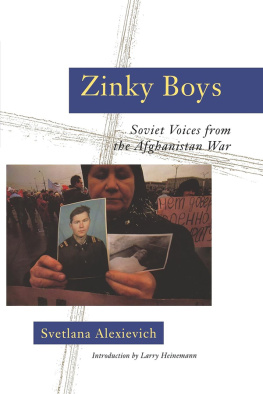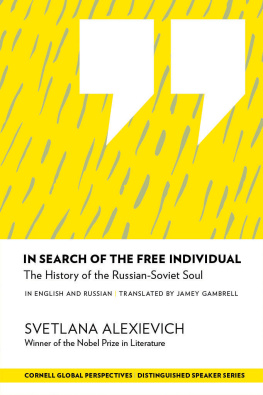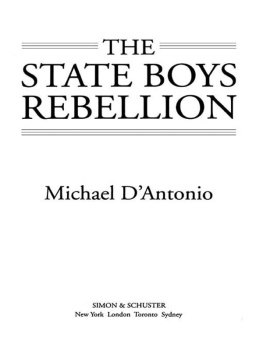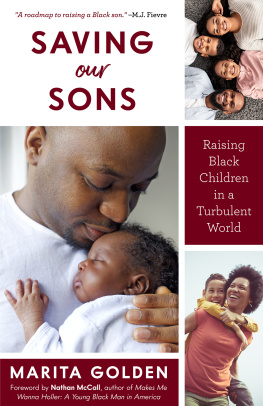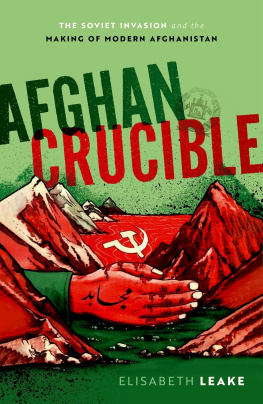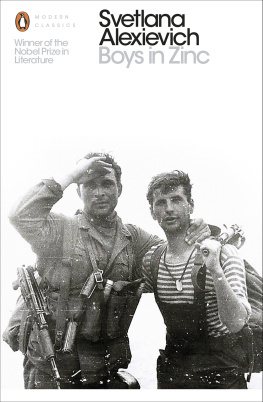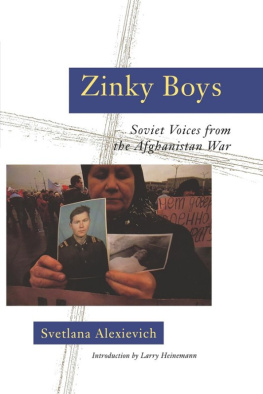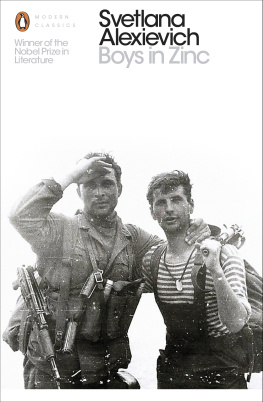
Zinky Boys
Soviet Voices from the Afghanistan War

SVETLANA ALEXIEVICH
Translated by Julia and Robin Whitby
W.W. Norton & Company
New York London
Contents
Note: The introduction has been omitted due to rights issues.
The voices in this book speak against two different backgrounds: the ten-year war in Afghanistan, and a great turbulence at the heart of Soviet society.
The roots of the war go back at least 150 years, to the struggle between Russia and Britain for influence in Central Asia. In the nineteenth century, after two wars with Britain, Afghanistan became a buffer state between British India and Russia. A third war led to independence in 1921. A monarchy, established in 1926, was overthrown in 1973 by Mohammed Daud, who was assassinated in 1978. The new government was headed by Nur Mohammed Taraki and his Marxist Peoples Democratic Party. The following year, after two further coups, Babrak Karmal came to power with Soviet backing. This event effectively marked the outbreak of war between the rebels (mujahedin) on one side and the Soviet and Afghan government forces on the other. Mohammed Najibullah, who became President in 1987, has to date survived the complete evacuation of Soviet forces in 1989 and the continuing determination of the rebels to establish an Islamic state. Soviet economic and military aid continues to succour the Najibullah regime on a massive scale.
It has been estimated that the conflict has cost approximately one million Afghan lives.
The men and women who express their thoughts and experiences in the following pages need no introduction they must speak for themselves. The confusion and contradictions displayed by some are as revealing as the honesty and insight of others. As we listen to them, however, we need to bear in mind certain aspects of Soviet life with no immediate parallel in the West.
To begin with, we may find it difficult to envisage the almost complete ignorance in which the Soviet public was kept about the war, at least until the advent of some measure of media freedom (the celebrated glasnost) in the mid-1980s. The information available to ordinary people amounted to a few pat phrases about the limited contingent of Soviet troops and the fulfilling of international obligations, together with much anti-American propaganda. True public debate and political opposition of the sort which, at the very least, provides some counterweight to the government version of events in more open societies, simply did not exist.
Another factor, related to this ignorance, was the ruthless secrecy with which news of casualties was treated. This applied not only to the press, but to society in general. To take just two examples: in the hope of obscuring the true impact of the war, some local authorities refused to allow special areas in cemeteries to be set apart for the graves of soldiers killed in Afghanistan; while others forbade the cause and place of death to be stated on gravestones or memorial shields.
Soviet army sources recently stated that the war claimed the lives of some 15,000 military personnel, with more than double that number seriously wounded. In a country of 280 million, and over a ten-year period, this might seem acceptable in the dreadful calculus of modern conflict. Three factors in particular, however, give the lie to any such complacency. First, this was, in the main, a war fought not by professional soldiers but by conscripts aged between 18 and 20, and it was they who suffered the brunt of the casualties (and the dreadful institutionalised bullying inseparable from Soviet army life). Second, the total lack of government accountability meant that there was hardly any informed public discussion of, let alone support for, the war. Third, for obvious reasons of political and military reliability, Soviet forces in Afghanistan were disproportionately some would say almost entirely drawn from the non-Islamic republics of the USSR, i.e. Russia, Belorussia, Moldavia, Ukraine, Georgia, Armenia and the Baltic states. (Many of those who speak to us in the following pages are Belorussian, as is Svetlana Alexievich herself.) An additional cause of resentment was the rumoured ability of certain privileged members and sections of society to buy their sons out of danger.
Finally, readers without first-hand experience of the Soviet Union may be struck by the almost obsessive interest in imported goods and clothes revealed by a few of the speakers. This simply reflects the fact that in an economy where almost any item used in daily life may be impossible to find, or appallingly shoddy, or just plain drab, such scarce articles can command enormously high prices and confer prestige on their owners.
The men and women who make up this book are very diverse; perhaps all they have in common is that they were affected by the war in Afghanistan. It is no exaggeration to say that they offer us a unique insight into the Soviet condition at a turning-point in the countrys history; but they also have something to tell us about our common humanity and inhumanity.
Afgani (slang: afoshki): units of local currency.
Afgantsi (singular Afganets): Soviet veterans of the war.
APC: armoured personnel carrier.
cheki: foreign currency vouchers paid to Soviet personnel abroad as part of, or in addition to, their salaries.
dembel (from Russian dembel, demobilisatsiya): conscript nearing the end of his two years service.
dukh (abb. of dukhman): member of the mujahedin.
grandad (Russian ded): conscript with some considerable part of his two years service behind him.
vets: war veterans.
Asterisked footnotes, and explanatory notes between square brackets, have been added by the translators. The verse renderings of Russian songs and poems are also our own.
JW& RW
Zinky Boys
14 June 1986
I never want to write another word about the war, I told myself. Long after Id finished War is not a Woman, a book about World War II, I could still be upset by the sight of a child with a nosebleed. Out in the country I couldnt bear to watch the fishermen cheerfully throwing their catch on to the sandy river-bank. Those fish, dragged up from the depths of God knows where, with their glassy, bulging eyes, made me want to vomit. I dare say we all have our pain threshold physical as well as psychological. Well, Id reached mine. The screech of a cat run over by a car, even the sight of a squashed worm, could make me feel I was going mad. I felt that animals, birds, fish, every living thing had a right to a life of its own.
And then all of a sudden, if you can call it sudden for the war had been going on for seven years
One day we gave a lift to a young girl. Shed been to Minsk to do some food shopping for her mother. She had a big bag with chicken heads sticking out, I remember, and a shopping-net full of bread, which we put in the boot.
Her mother was waiting for her in the village. Or rather, standing at her garden gate, wailing.
Mama! The little girl ran up to her.
Oh, my baby. Weve had a letter. Our Andrei in Afghanistan. Ohhh Theyre sending him home, like they did Ivan Fedorinov. A little child needs a little grave, isnt that what they say? But my Andrei was as big as an oak and over six foot. Be proud of me Mum, Im in the Paras now, he wrote to us. Oh, why? Why? Can anyone tell me? Why?
Each substance of a grief hath twenty shadows.
Next page
